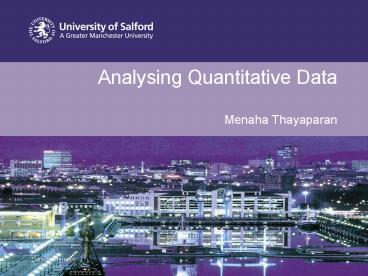Analysing Quantitative Data Menaha Thayaparan - PowerPoint PPT Presentation
1 / 15
Title:
Analysing Quantitative Data Menaha Thayaparan
Description:
MathScope is a support unit for those of you who may experience difficulties ... The practice of operation research by George Mitchell (John Wiley & Sons) ... – PowerPoint PPT presentation
Number of Views:393
Avg rating:3.0/5.0
Title: Analysing Quantitative Data Menaha Thayaparan
1
Analysing Quantitative DataMenaha Thayaparan
Date or reference
2
An Overview
- Research Process
- Research Cycle
- Data Collection
- Data Analysis
- Presentation
3
Research Process
- What is research?
- The starting point
- Possible phases
- Literature phase
- Data phase
- Writing up phase
4
Research Cycle
Knowledge domain
contribution
Set Problem /Hypothesis
Answer problem/ Test Hypothesis
Data Analysis
Design Research Strategy
Data Collection
5
Data Collection
- Type of data to be collected
- Primary data
- Secondary data
- Process / Method
- Breadth Vs Depth
- Surveys Vs Case studies
- Quantitative Vs Qualitative
- Techniques
- Questionnaires open ended, close ended
- Interviews structured, semi-structured,
unstructured - Observations
- Document review
6
Data Collection use of statistics
Probability Sampling Random Systematic Stratified
Non-Probability Sampling Clustered Snowball Oppor
tunity
POPULATION
SAMPLE
Sampling Techniques
SAMPLE
INFERENTIAL Statistics
DESCRIPTIVE Statistics
7
Data Collection
- Target the right Population
- Decide on the size of the Sample (larger/ small)
- Use the appropriate Sampling Techniques
- Probability sampling Vs Non-probability sampling
- Confidence in the sampling method, then the data
- Ultimately the conclusions will be drawn
8
Data Analysis
- Data Descriptors
- Measures of Central Tendency
- Mean, Median, Mode
- Adverse effect by any outlying data
- Measures of Dispersion
- Range
- Standard Deviation
- Make the Data meaningful
- Mean Standard Deviation (describe in just 2
numbers) - Confidence Intervals the range of means that we
could expect 95 or 99 or 99.9 of the time if
we were to repeat the same type of measurement
again and again on different samples - Estimate of the Mean and Standard Deviation of
the Population
Why Dispersion? Data set 1- 4,6 Mean
5 Data set 2 - 2,8 Mean 5 Difficulty in
interpretation! Present with Mean, Range For
Data set 1 5, 2 For Data set 2 5, 6
9
Data Analysis
- Hypothesis Test (Most common type)
- A believe put forward to account for certain
facts and used as a basis for further
investigation by which it may be proved or
disproved - Establishes a position which can be proved or
disproved. - There are only two possible outcomes to a
hypothesis test, the hypothesis is proved or it
is disproved. - Three situations
- Test for the mean
- Difference between two means
- For paired samples
10
Data Analysis
- ANOVA (ANalysis Of VAriance)
- Extension of Hypothesis testing
- Is a type of Hypothesis test
- Hypothesis test looks at a maximum of two sets of
data values - ANOVA can deal with any amount of data sets
- Will only determine whether or not there is a
significant difference between sets of data
values
11
Data Analysis
- Correlation Regression
- Variables are tested for association
(Correlation) - Positive Vs Negative correlation
- Strong Vs weak correlation
- Forecasting (Regression)
- Describe the relationship precisely by means of
an equation that has predictive value - When need to express relationship between
quantities that are known (X) and quantities that
are to be predicted (Y) by using mathematical
equations - Y a b X
Independent variable
Dependent variable
12
Selection of the most appropriate method
- Your research question drives your method
- Want to describe
- Want to compare
- Want to find out a relationship
- Want to test a hypothesis
- Choose the best method for answering your
research question - Choose the methods that best suits your values
and skills - Remember! one approach is not better or worse
than the other, they simply provide different
types of information - Triangulation method use of both Quantitative
and Qualitative data
13
Presentation
- Use of IT
- MS Excel
- SPSS (Statistical Package for Social Sciences)
- Text
- Tables
- Charts
- Graphs
- Histograms, Frequency polygon
14
Where to get help
- MathScope is a support unit for those of you who
may experience difficulties with mathematics in
whatever subject you are studying. - Location Room G12 Cockcroft Building
- Visit http//www.mathscope.salford.ac.uk/homepag
e2.htm - Phone 0161 295 4787
- Other literature source recommended books
- Essential Statistics by DG Rees (Chapman Hall)
- The practice of operation research by George
Mitchell (John Wiley Sons) - Statistics by A.Mayer A.Sykes (Arnold)
- Data Analysis using SPSS for windows by J.Foster
(Sage) - SPSS Survival Manual by Julie Pallant (O.U.P)
- Contact your lecturers
15
- Thank you
- Menaha Thayaparan
- School of the Built Environment
- The University of Salford
- m.thayaparan_at_pgr.salford.ac.uk































